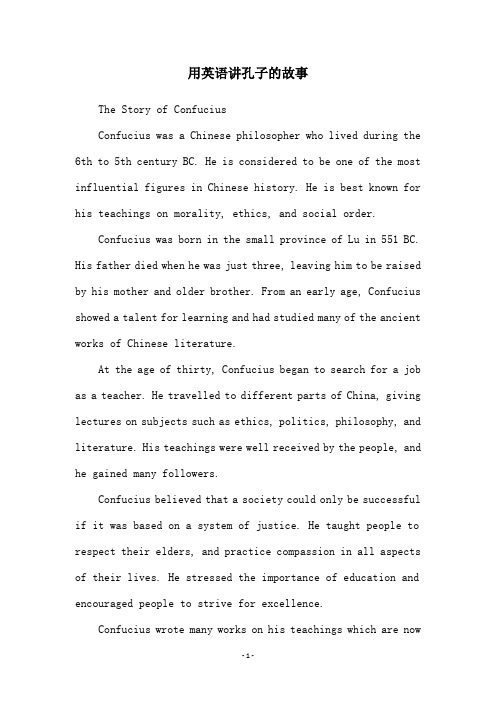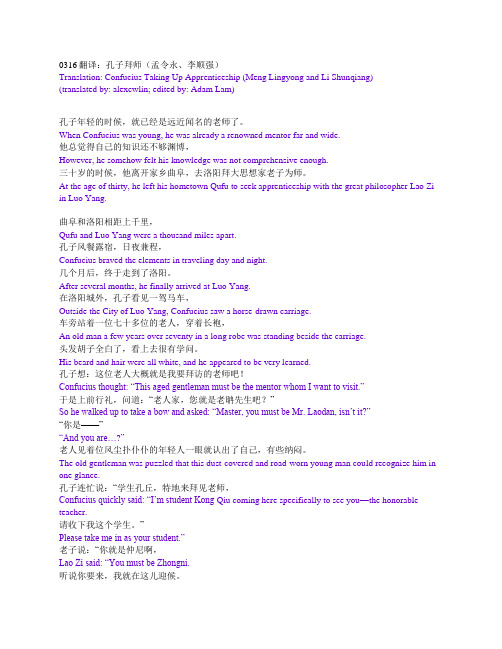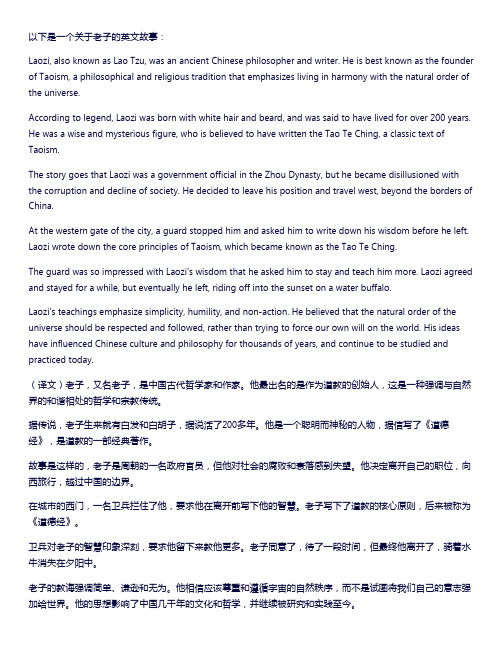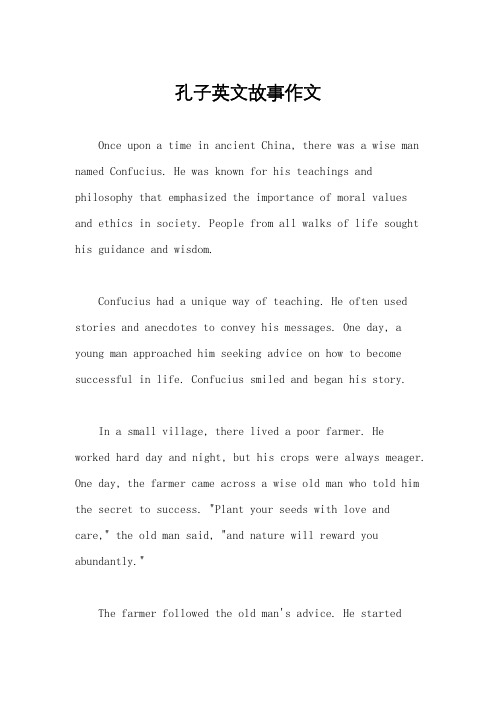孔子拜师老子的故事英文版
用英语讲孔子的故事

用英语讲孔子的故事The Story of ConfuciusConfucius was a Chinese philosopher who lived during the 6th to 5th century BC. He is considered to be one of the most influential figures in Chinese history. He is best known for his teachings on morality, ethics, and social order.Confucius was born in the small province of Lu in 551 BC. His father died when he was just three, leaving him to be raised by his mother and older brother. From an early age, Confucius showed a talent for learning and had studied many of the ancient works of Chinese literature.At the age of thirty, Confucius began to search for a job as a teacher. He travelled to different parts of China, giving lectures on subjects such as ethics, politics, philosophy, and literature. His teachings were well received by the people, and he gained many followers.Confucius believed that a society could only be successful if it was based on a system of justice. He taught people to respect their elders, and practice compassion in all aspects of their lives. He stressed the importance of education and encouraged people to strive for excellence.Confucius wrote many works on his teachings which are nowknown as the Analects. These books have become very influential and are still studied by scholars around the world today.Confucius died in 479 BC, but his legacy lives on. His teachings are still studied and applied in many parts of Asia and elsewhere. He is remembered as one of the most influential figures in Chinese history and his teachings are still used to shape the way people think, act, and live.。
0316翻译孔子拜师

0316翻译:孔子拜师(孟令永、李顺强)Translation: Confucius Taking Up Apprenticeship (MengLingyong and Li Shunqiang)(translated by: alexcwlin; edited by: Adam Lam)孔子年轻的时候,就已经是远近闻名的老师了。
When Confucius was young, he was already a renowned mentor far and wide.他总觉得自己的知识还不够渊博,However, he somehow felt his knowledge was not comprehensive enough.三十岁的时候,他离开家乡曲阜,去洛阳拜大思想家老子为师。
At the age of thirty, he left his hometown Qufu to seek apprenticeship with the great philosopher Lao Zi in Luo Yang.-------------------------------------------------------------------------------------------------------曲阜和洛阳相距上千里,Qufu and Luo Yang were a thousand miles apart.孔子风餐露宿,日夜兼程,Confucius braved the elements in traveling day and night.几个月后,终于走到了洛阳。
After several months, he finally arrived at Luo Yang.在洛阳城外,孔子看见一驾马车,Outside the City of Luo Yang, Confucius saw a horse-drawn carriage.车旁站着一位七十多位的老人,穿着长袍,An old man a few years over seventy in a long robe was standing beside the carriage.头发胡子全白了,看上去很有学问。
关于老子的英文故事

以下是一个关于老子的英文故事:Laozi, also known as Lao Tzu, was an ancient Chinese philosopher and writer. He is best known as the founder of Taoism, a philosophical and religious tradition that emphasizes living in harmony with the natural order of the universe.According to legend, Laozi was born with white hair and beard, and was said to have lived for over 200 years. He was a wise and mysterious figure, who is believed to have written the Tao Te Ching, a classic text of Taoism.The story goes that Laozi was a government official in the Zhou Dynasty, but he became disillusioned with the corruption and decline of society. He decided to leave his position and travel west, beyond the borders of China.At the western gate of the city, a guard stopped him and asked him to write down his wisdom before he left. Laozi wrote down the core principles of Taoism, which became known as the Tao Te Ching.The guard was so impressed with Laozi's wisdom that he asked him to stay and teach him more. Laozi agreed and stayed for a while, but eventually he left, riding off into the sunset on a water buffalo.Laozi's teachings emphasize simplicity, humility, and non-action. He believed that the natural order of the universe should be respected and followed, rather than trying to force our own will on the world. His ideas have influenced Chinese culture and philosophy for thousands of years, and continue to be studied and practiced today.(译文)老子,又名老子,是中国古代哲学家和作家。
孔子英文故事作文初中

孔子英文故事作文初中Once upon a time, there was a wise man named Confucius. He was a great thinker and educator in ancient China. People from all over the country came to him to seek advice and wisdom.One day, a young man came to Confucius and asked him, "Master, what is the most important thing in life?" Confucius thought for a moment and replied, "The most important thing in life is to be kind and respectful to others. Treat others as you would like to be treated."Another time, a wealthy merchant sought Confucius' counsel on how to become successful. Confucius told him, "To be successful, one must be honest and hardworking. Do not seek success at the expense of others, but strive to achieve it through your own efforts."Confucius also emphasized the importance of learning and self-improvement. He once said, "Learning is a lifelongjourney. It is important to constantly seek knowledge and wisdom, and to reflect on one's own actions and beliefs."In his teachings, Confucius stressed the value of family and relationships. He believed that harmony within the family and society was essential for a peaceful and prosperous life. He said, "Respect your parents and elders, and treat your siblings with love and care. In doing so, you will create a harmonious and happy family."Confucius' teachings have had a profound impact on Chinese culture and society. His wisdom and philosophy continue to inspire people around the world to this day.。
孔子英文故事

以下是一个关于孔子的英文故事:Once upon a time, there was a wise man named Confucius. He lived in a small village called Lu, which is now located in modern-day China. One day, Confucius was walking through the village when he saw a group of children playing a game.Confucius asked one of the children what they were playing, and he was told that it was a game called "the art of war." Confucius was interested in this game and asked to join in. The children showed him how to play, and Confucius found that he had anatural talent for it.As Confucius continued to play the game, herealized that it was not just about winning or losing, but about understanding the principles of strategyand leadership. He soon became very good at the game and won many matches.Afterward, Confucius went back to his village and told the other children about his experience playing the game. He emphasized the importance of understanding the principles of war and leadership inorder to be a successful leader.From that day on, the children in the village started to refer to Confucius as "the Master" because of his wisdom and his ability to teach others about the principles of war and leadership.This story shows us the importance of learning from our experiences and using what we learn to help others. It also highlights the role of a wise teacher in passing on knowledge and wisdom to others.。
孔子英文故事作文

孔子英文故事作文Once upon a time in ancient China, there was a wise man named Confucius. He was known for his teachings and philosophy that emphasized the importance of moral values and ethics in society. People from all walks of life sought his guidance and wisdom.Confucius had a unique way of teaching. He often used stories and anecdotes to convey his messages. One day, a young man approached him seeking advice on how to become successful in life. Confucius smiled and began his story.In a small village, there lived a poor farmer. He worked hard day and night, but his crops were always meager. One day, the farmer came across a wise old man who told him the secret to success. "Plant your seeds with love and care," the old man said, "and nature will reward you abundantly."The farmer followed the old man's advice. He startedtreating his crops like his own children. He watered them, nurtured them, and protected them from pests. Slowly, his farm began to flourish. The news of his success spread, and soon, people from far and wide came to learn from him.Confucius paused for a moment, allowing the young manto reflect on the story. He then continued with another tale.In a bustling city, there was a greedy merchant whoonly cared about making money. He would cheat his customers, sell low-quality products, and exploit his workers. Despite his wealth, he was despised by everyone.One day, a poor beggar approached the merchant andasked for some food. Instead of helping the beggar, the merchant insulted him and chased him away. Little did the merchant know, the beggar was actually a wise sage in disguise.The sage cursed the merchant, saying, "From this day forward, may your wealth turn to dust, and your heart befilled with regret." True to the sage's words, the merchant's business started to decline. His customers abandoned him, and his workers revolted against his mistreatment.Confucius paused again, allowing the young man to absorb the moral of the story. He then shared one final anecdote.In a peaceful village, there lived a humble blacksmith. He was known for his exceptional skills and craftsmanship. One day, a prince visited the village and challenged the blacksmith to a duel. The prince was confident that his royal blood would make him victorious.The blacksmith accepted the challenge but did not fight back aggressively. Instead, he gracefully dodged theprince's attacks and countered with precise and skillful moves. Eventually, the prince grew tired and admitted defeat.Confucius concluded his story by saying, "Success doesnot always come from brute force or power. It comes from wisdom, humility, and the ability to adapt and overcome challenges."The young man thanked Confucius for his enlightening stories and promised to apply the lessons in his own life. Confucius smiled and said, "Remember, my young friend, true success lies not in material wealth, but in the cultivation of one's character and the pursuit of virtuous actions."。
有关孔子的故事英语
以下是一个关于孔子的英文故事:Confucius, whose original name was Kong Qiu, was born in 551 BCE in the State of Lu, China. He was a great philosopher and educator who has had a profound influence on Chinese culture and history.Confucius's family was poor, but his parents valued education highly and taught him to read and write at an early age. Confucius was a diligent student and was known for his love of learning.When Confucius was in his thirties, he began to travel throughout China, seeking to understand the world and find answers to life's big questions. He studied with many masters and learned from them, eventually developing his own philosophy.Confucius believed in the importance of education, filial piety, and social harmony. He taught that people should strive to become ethical, responsible, and virtuous, and that rulers should govern with justice and compassion.Confucius's teachings were recorded in a collection of books called The Analects, which has been studied and revered by generations of Chinese scholars and leaders. His ideas have also had a profound influence on Chinese art, literature, and culture.Confucius's legacy continues today, as his teachings on ethics, morality, and social responsibility are still relevant and valuablein modern times. He is remembered as a wise and enlightened thinker who made a lasting contribution to Chinese civilization.译文:孔子,原名孔丘,公元前551年出生于中国鲁国。
孔子寓言故事英文版
孔子寓言故事英文版Confucius Parables in EnglishConfucius was an ancient Chinese philosopher and thinker whose teachings and philosophies have had a profound impact on East Asian culture and society for centuries. One of the hallmarks of Confucian thought is the use of parables and anecdotes to convey moral and ethical principles. These short stories often feature simple characters and situations that illustrate complex ideas about human nature, social relationships, and the pursuit of virtue.One of the most well-known Confucian parables is the story of the "Blind Man and the Cripple." In this tale, a blind man and a crippled man are stuck in a ditch, unable to escape on their own. The blind man cannot see the way out, while the crippled man cannot walk. However, when they work together, with the blind man carrying the crippled man on his back, they are able to climb out of the ditch and continue on their way.This parable is often interpreted as a metaphor for the interdependence and mutual support that should exist within a community. Just as the blind man and the cripple needed each otherto overcome their individual limitations, so too should members of a society draw on each other's strengths and compensate for each other's weaknesses. The message is one of cooperation, empathy, and the recognition that we all have something to contribute to the greater good.Another well-known Confucian parable is the story of the "Broken Piece of Jade." In this tale, a man finds a broken piece of jade and, recognizing its inherent value, decides to keep it and polish it, rather than discarding it. Over time, the man's efforts transform the broken piece of jade into a beautiful and valuable object.This parable is often interpreted as a metaphor for the inherent worth and potential of all human beings, regardless of their current circumstances or apparent flaws. Just as the broken piece of jade was transformed into something of great beauty and value, so too can individuals who are seemingly "broken" or imperfect be nurtured and developed into something extraordinary. The message is one of compassion, patience, and the belief in the ability of all people to grow and improve.One of the most famous Confucian parables is the story of the "Farmer and the Snake." In this tale, a farmer discovers a snake that has been frozen by the cold and takes pity on it, bringing it into his home to warm it up. As the snake begins to thaw, it suddenly turnson the farmer and bites him, causing the farmer to exclaim, "How could you do this to me after I saved your life?"This parable is often interpreted as a cautionary tale about the dangers of trusting those who have harmed us in the past, or of showing kindness to those who may not be worthy of it. The message is one of prudence, discernment, and the recognition that even the most well-intentioned actions can sometimes have unintended consequences.Another Confucian parable that is often cited is the story of the "Monkey Trainer." In this tale, a monkey trainer is teaching his monkeys to perform a series of tricks, and he rewards them with food when they perform the tricks correctly. However, the trainer soon realizes that the monkeys are not learning the tricks for the sake of learning, but rather for the reward of the food. Frustrated, the trainer decides to withhold the food, and the monkeys quickly lose interest in the tricks and refuse to perform them.This parable is often interpreted as a metaphor for the importance of intrinsic motivation and the dangers of relying too heavily on extrinsic rewards. The message is that true learning and growth can only come from a genuine desire to learn and improve, rather than from a focus on external incentives or punishments. The parable suggests that the best way to cultivate virtue and wisdom is to fostera love of learning and a commitment to self-improvement, rather than simply chasing after rewards or avoiding punishments.Finally, one of the most well-known Confucian parables is the story of the "Broken Piece of Jade." In this tale, a man finds a broken piece of jade and, recognizing its inherent value, decides to keep it and polish it, rather than discarding it. Over time, the man's efforts transform the broken piece of jade into a beautiful and valuable object.This parable is often interpreted as a metaphor for the inherent worth and potential of all human beings, regardless of their current circumstances or apparent flaws. Just as the broken piece of jade was transformed into something of great beauty and value, so too can individuals who are seemingly "broken" or imperfect be nurtured and developed into something extraordinary. The message is one of compassion, patience, and the belief in the ability of all people to grow and improve.Overall, the parables and anecdotes of Confucius are a rich and enduring part of the Chinese philosophical tradition. They offer timeless lessons about the importance of virtue, social harmony, and the cultivation of wisdom and character. By studying these stories and reflecting on their deeper meanings, we can gain valuableinsights into the human condition and the pursuit of a meaningful and fulfilling life.。
有关孔子的故事英语
有关孔子的故事英语Confucius: A Journey of WisdomIntroductionConfucius, a renowned philosopher and educator, has left an indelible mark on Chinese history and culture. His teachings continue to influence and inspire people worldwide. In this article, we will delve into some of the captivating stories about Confucius, exploring his life, the principles he espoused, and the enduring impact he has had on society.Early Life and EducationBorn in 551 BCE in the Lu state of China, Confucius, also known as Kong Qiu, showed great intelligence and curiosity from a young age. He had a thirst for knowledge and eagerly sought out esteemed scholars to learn from. Confucius deeply believed in the power of education and dedicated his life to its pursuit.The Journey to WisdomConfucius embarked on a journey across various states, seeking opportunities to impart his wisdom and bring about positive change. It was during this period that he encountered significant challenges, both personally and professionally. Despite these hardships, he persevered, relying on his moral compass and determination to make a difference.Teachings and PhilosophyConfucius developed a comprehensive philosophy centered around the concept of ethics, with the goal of establishing a harmonious society. Heemphasized the importance of self-improvement, advocating for individuals to cultivate personal virtues such as benevolence, righteousness, and propriety. Confucius believed that by embodying these virtues, individuals could positively impact their families, communities, and even the entire nation.The Analects: A Moral GuideConfucius' teachings were compiled into a book called the Analects. This collection of his sayings and conversations with his disciples serves as a moral guide and a source of inspiration for generations. The Analects contain profound insights into various aspects of life, including education, governance, and interpersonal relationships.The Golden Rule: "Do not do to others what you would not want done to you."One of Confucius' most famous teachings is the Golden Rule, which underlines the importance of empathy and compassion. This principle encourages individuals to treat others with respect and kindness, promoting harmony and understanding in society. The Golden Rule remains a cornerstone of ethical behavior not only in Chinese culture but also around the world.Confucius and Education ReformConfucius revolutionized education during his time, advocating for a system that emphasized character development and moral education. He believed that education should go beyond intellectual pursuits and promote the holistic development of individuals. Confucius' ideas continue to shapeeducational philosophy and practice, emphasizing the cultivation of noble character alongside academic achievement.Confucianism: A Philosophical TraditionConfucius' teachings laid the foundation for Confucianism, a philosophical tradition deeply ingrained in Chinese culture. Confucianism has had a profound impact on various aspects of Chinese society, including governance, familial relationships, and social norms. Even today, Confucian values continue to shape Chinese identity and guide individuals in their daily lives.Confucius' LegacyConfucius' legacy transcends time and geographic boundaries. His teachings have not only influenced Chinese civilization but have also resonated with people from diverse cultures worldwide. Confucius' emphasis on ethical conduct, respect for tradition, and the pursuit of knowledge has found relevance in the modern world, highlighting the enduring wisdom of his philosophy.ConclusionConfucius, a legendary figure in Chinese history, has left an indelible mark on humanity. His teachings continue to inspire generations, serving as a guiding light in navigating the complexities of life. From his emphasis on education and moral conduct to his profound insights into human relationships, Confucius' legacy will forever illuminate the path towards personal and societal well-being.。
孔子的生平经历英语作文
孔子的生平经历英语作文(中英文实用版){z}Title: The Life of ConfuciusConfucius, whose original name was Kong Qiu, was a renowned Chinese philosopher and teacher who lived from 551 to 479 BC.He is considered one of the most influential figures in Chinese history and his teachings have had a profound impact on Chinese culture, philosophy, and ethics.Confucius was born into a humble family in the state of Lu, which is present-day Shandong Province.His father, a high-ranking official, died when Confucius was three years old, leaving him in the care of his mother.Despite their poverty, Confucius received a good education, studying poetry, music, and history.At the age of 19, Confucius became a teacher, opening his own school and teaching a small group of students.He believed in the power of education to improve individuals and society, and he emphasized the importance of moral character, respect for authority, and proper behavior in his teachings.In his early thirties, Confucius became involved in politics when he was appointed as the Minister of Works in the state of Lu.However, his political career was short-lived as he was later accused of corruption and had to resign.After his resignation, Confucius traveled extensivelythroughout China, visiting other states and learning from various philosophies and cultures.It was during this time that Confucius further developed his philosophical ideas and teachings.He believed that in order to achieve social harmony and personal fulfillment, individuals must cultivate virtues such as仁(ren), which means benevolence or humaneness, and礼(li), which means proper conduct or ritual.Confucius returned to his home state of Lu in his fifties and resumed his role as a teacher.He continued to teach and spread his philosophy until his death at the age of 72.His teachings were later compiled into a book called the "Analects," which is still studied and revered today.Confucius"s philosophy emphasizes the importance of moral character, education, and proper behavior in both personal and social life.His ideas have had a lasting impact on Chinese society and have been influential in the development of other East Asian cultures.Confucius is buried in his hometown of Qufu, where he is still honored as a national hero and his teachings continue to inspire people around the world.。
